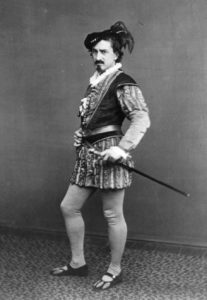When I first heard that Strange Magic, Lucasfilm’s new animated effort was “inspired by Midsummer Night’s Dream” I wanted to be excited. I really did. I wasn’t exactly holding my breath, however.
Good thing. Whoever started throwing around Shakespeare’s name in the marketing for Strange Magic seems to have had about a high school student’s knowledge of the subject, at best. A C student.
The way I explained “inspired by Shakespeare” to my kids went a little something like this:
There are basically three different ways that a movie can use Shakespeare. I’m not talking about actual movie versions of Shakespeare plays, I mean original movies that say they’ve got something to do with Shakespeare. First are the movies that come right out and talk about Shakespeare and use his words. Like Gnomeo and Juliet. Then there’s movies that don’t use any of his words, but try to tell a modern version of one of his stories. (10 Things I Hate About You is the classic example here, though my kids don’t know that movie.) Then there’s movies that just take a single idea that came from Shakespeare and throw the rest away, thinking that just because they’ve got a boy and a girl whose parents don’t like each other they can call it Romeo and Juliet, or just because a king gets killed by his evil brother you can call it Hamlet with lions.
Strange Magic sits firmly in this final group. There’s a love potion and there’s fairies, therefore we can claim it’s got something to do with Shakespeare. No humans. No war between a king and queen of the fairies. There’s an “imp” who I guess we’ll call Puck who runs around throwing the potion on people for fun, but entirely minor characters in a single montage, that has nothing to do with the story. There is no parallel at all for Helena/Hermia/Demetrius/Lysander that I could figure out.
In fact, as I also pointed out to my kids, this story has more in common with a completely different Shakespeare story, and I bet the creators didn’t even realize it. The king of the fairies has two daughters – Marianne and Dawn. (Trivia for you – on the television show Gilligan’s Island, the character of Marianne was played by Dawn Wells). Marianne, for reasons that are obvious in the first two minutes, has sworn off love for good. Dawn, the younger sister, is boy crazy. The king basically won’t let Dawn get married until Marianne does.
Ok, show of hands, sound familiar to anybody? That’s right, it’s Taming of the Shrew.
But, again, that’s as far as it goes. The actual story is all over the place, and honestly a pretty shameful product from a name like Lucasfilm. More than once I felt it was the kind of thing that seemed like it was written in about a half a day, and felt like one of my middle daughter’s straight-to-video Barbie movies. There’s a good forest and a scary dark forest, and along the border between the two is the only place that the primroses grow. And primroses are used to make love potion, of course. But only the Sugar Plum Fairy can make love potion. But the evil Bog King, ruler of the dark forest, has captured her and ordered that all the primroses be cut down (the latter, by the way, is a plot point that has absolutely zero bearing on the plot as the hero finds a primrose petal as soon as he goes looking for one). So of course the meek little best friend of the younger sister, who is secretly in love with her, gets convinced by the other bad guy, who wants to marry the older sister in order to raise an army (something else that’s never really explained), that he (the shy one) should go get a love potion, and then it all just gets weird.
Oh, and it’s a musical. Of cover songs. Like a big Glee episode. When someone gets hit with the love potion they apparently just start singing “Sugar pie, honey bunch” over and over again.
Skip Strange Magic. I can’t really find anything worth recommending. It looks nice, I’ll give it that. But even that is weird, as none of the characters have that “I wish I could get that in a stuffed animal or action figure” appeal. The fairies look so human that every time they sprout wings you think “Where did THOSE come from?” and the goblins are so shapeless and generic that there’s even a joke in the script that they can’t tell their own gender apart.


 What does that all mean? Iago was lobbying for the lieutenant’s position under Othello (“his Moorship”) and even had some high-powered citizens/politicians (“great ones of the city”) go and offer their personal recommendation, only to find that Othello had already chosen Michael Cassio. Iago is not happy with this decision, and has nothing good to say of Cassio, who has no battle experience (as Iago does), and is instead what today might be called “book smart.”
What does that all mean? Iago was lobbying for the lieutenant’s position under Othello (“his Moorship”) and even had some high-powered citizens/politicians (“great ones of the city”) go and offer their personal recommendation, only to find that Othello had already chosen Michael Cassio. Iago is not happy with this decision, and has nothing good to say of Cassio, who has no battle experience (as Iago does), and is instead what today might be called “book smart.”